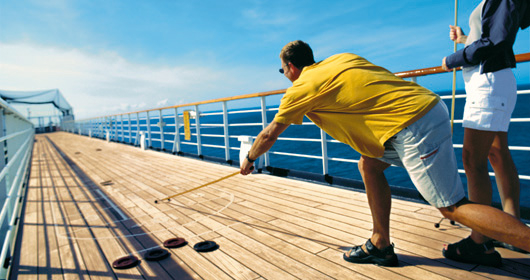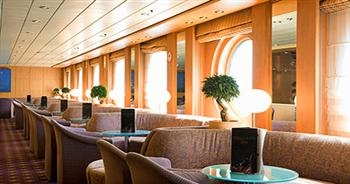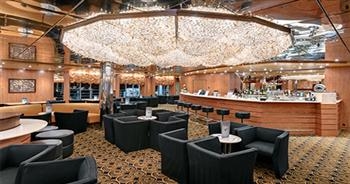Please complete the form below



Santos, one of Portugal’s first New World settlements, was founded in 1535.
Today your MSC ship will be docking in Latin America’s largest port, through which passes a large proportion of the world’s coffee, sugar and oranges.
The city stands partly on São Vicente island, its docking facilities and old town facing landwards, with ships approaching by a narrow, but deep, channel. Its compact centre retains a certain charm that’s massively popular with local tourists, and there is a good deal of historical and maritime interest around the city. On an MSC South America cruise excursion to the city centre you’ll find the ruins of some of Santos’s most distinguished buildings along Rua do Comércio.
Although sometimes only the facades remain, some of the nineteenth-century former merchants’ houses that line the street are gradually being restored, the elaborate tiling and wrought-iron balconies offering a hint of the old town’s lost grandeur. MSC South America cruises also offer excursions to the local Santos Futebol Clube. It’s best known as the club for which the great Pelé
played for most of his professional life (from 1956 to 1974); their stadium, the Vila Belmiro, is open to the public when there’s no game on.
In addition to honouring Pelé at the club’s small museum, you can take an hour-long guided tour including the players’ bar and dressing rooms. Santos’s beaches are across town from Centro on the south side of the island. The beaches are huge, stretching around the Atlantic-facing Baía de Santos, and popular in summer.
Mindelo is a portcity on the Cape Verde in the northern part of the island of São Vicente. Mindelo is also the seat of the parish of Nossa Senhora da Luz, and this island’s municipality. São Vicente is a small volcanic island integrated in the group of the islands of Barlavento, between Santo Antão, on the West, and Santa Luzia, on the East. The island was discovered on January 22 of 1462, but it was uninhabited until 1838, when the British decided to install a coaling-station in Mindelo to supply the ships that navigated in the Atlantic routes. During many centuries, São Vicente was used for cattle pasturage, namely goats and temporary hunt-preserve. Nevertheless, the excellent port characteristics of the Bay of Mindelo made the island in one of the most important worlds trade post for the supply of coal to the ships that crossed the Atlantic, and it soon became the uppermost place where foreign going ships came for coal supply.
Las Palmas de Gran Canaria Las Palmas is a city (and municipality) on the island, Gran Canaria, which is one of the Canary Islands (Spain) located 210 kilometers off the northwestern coast of the African continent within the Atlantic Ocean. It is also the capital city of the province of Las Palmas and the co-capital of the autonomous community of the Canary Islands, sharing this status with Santa Cruz de Tenerife. The city was founded on June 24, 1478, with the name “Real de Las Palmas” by Juan Rejón, head of the invading Castilian army, before engaging in war with the local Guanches (aboriginal people of the Canary Islands). In 1492, Christopher Columbus anchored in the Port of Las Palmas (and spent some time on the island) on his first trip to the Americas. He also stopped on the way back to Spain. Today, a museum is named after him -Casa Colón – in the Vegueta area of the city. Las Palmas de Gran Canaria is today a cosmopolitan city. It has five beaches (Las Canteras, Las Alcaravaneras, San Cristobal, El Confital and La Laja) and a big seaport (Puerto de la Luz harbor) that was very important during the 70s and early 90s (and benefited greatly from the closure of the Suez Canal during the Arab-Israeli conflict).
Settled on the Strait of Gibraltar, Tangier, an MSC Mediterranean Cruises destination, is an energetic and multicultural port. This magical Moroccan city is distinguished by its whitewashed Medina, maze of evocative alleys, bustling squares, and fascinating people. Glimpse the Dar el Makhzen palace, the Church of Saint Andrew, Jardins de la Mendoubia park, and the famous Bab Al Fahs gate. Further afield, visit natural wonders including the surreal Caves of Hercules.
One of the busiest cruise ports in the Mediterranean, the seaside city of Barcelona is known for its iconic architecture, colourful culture, and world-class drinking and dining.
Explore Antoni Gaudí’s surreal Sagrada Família, the famous boulevard of the Ramblas, the medieval Barri Gótic, and the Museu Picasso. But there’s even more to discover in this sprawling Spanish city, an MSC Mediterranean Cruises destination: from hidden tapas bars and fabulous food markets to Europe’s biggest football stadium.
Discover the culture and colour of Civitavecchia, an MSC Mediterranean Cruises destination. This Italian gem is an enjoyable flight from many European and non-European cities. Celebrated for its 16th-century Michelangelo Fort, ancient Taurine Baths, and marble Vanvitelli fountain, the port is a convenient starting point for visiting Rome, Italy’s regal and romantic capital.
Messina may well be your first sight of Sicily, and – from your MSC holiday cruise ship – it’s a fine one, the glittering town spread up the hillside beyond its sickle-shaped Mediterranean harbour.
On a shore excursion you can discover Messina’s most important monument, the Duomo, which epitomizes the city’s phoenix-like ability to re-create itself from the ashes of its last disaster. It’s the reconstruction of a twelfth-century cathedral erected by Roger II, one of a series of great Norman churches of Sicily that include the sumptuous cathedrals of Palermo and Cefalù. The Duomo’s detached campanile, or bell tower, claims to be the largest astronomical clock in the world, and puts on its best show at noon every day, when a bronze lion (Messina’s ancient emblem) unleashes a mighty roar over the city that can be quite alarming if you’re not expecting it!
Just back from the Duomo, the truncated section of the twelfth-century Chiesa Annunziata dei Catalani squats below pavement level, and is Messina’s only surviving example of Arab/Norman church-building.
When you are cruising the Mediterranean Sea with MSC Cruises, the most obvious excursion from Messina is to the almost too charming hill town of Taormina, spectacularly located on a rocky bluff between the Ionian Sea and the soaring peak of Mount Etna, whose summit with its bleak lava wilderness is one of the most memorable landscapes Italy has to offer.
Once the beloved retreat of poets and writers, Taormina is now the most illustrious resort on the entire island, captivating its visitors with its famous ancient theatre, grand hotels and engaging small-town charm.
The UNESCO-protected port of Valletta, the capital of the island of Malta, is one of the must-see stops for every Mediterranean cruise of merit.
You can admire this port, constructed in the second half of the 16th century by the Frenchman Jean de la Valette and moulded by the religious and military Order of Saint John of Jerusalem, from your MSC ship even before disembarking. The over 300 monuments rising in little more than half a square kilometre make this a place with one of the greatest density of historical attractions to visit during a cruise, not mentioning other attractions such as its beaches, seaside locales and restaurants.
An excursion to the island can start right from its capital, Valletta, which enchants the cruise-goer with its famous Maltese balconies, which decorate the facades of houses in its old quarter. Surrounded by a multitude of churches, which the islanders assure are as many as the days of the year, the St. John’s Co-Cathedral is one of Malta’s biggest tourist attractions.
The National Museum of Archaeology, on the other hand, hosts prehistoric artefacts found on the island. By the Grand Harbour, one can visit the underground passages of Auberge de Castille and the beautiful Baracca Gardens, which overlook the harbour; at night, when the city gates would close, its porticoes served as shelter for travellers. To get a taste of the life of Malta’s ancient nobility, visit Casa Rocca Piccola.
A 16th century Palazzo now the residence of the 9th Marquis De Piro, it has period furnishings and has a bomb shelter built for protection against bombings during the Second World War. The set of the film Popeye can still be seen from Malta’s largest beach, as well as the Sanctuary of Our Lady of Mellieha with a fresco of the Blessed Virgin Mary with Christ; according to tradition, Saint Luke, who was shipwrecked on the island with Saint Paul, is the author of this Byzantine-style fresco.
With its seafront cafés and ancient alleyways, shouting stallholders and travellers on the move, bustling, exuberant Split is one of Croatia’s and the Mediterranean’s most compelling cities, it’s easy to see this feeling when you step aground from your MSC cruise.
It has a unique historical heritage too, having grown out of the palace built here by the Roman Emperor Diocletian in 295AD. The palace remains Split’s central ingredient, having been gradually transformed into a warren of houses, tenements, churches and chapels by the various peoples who came to live here after Diocletian’s successors had departed.
Adapted long ago to serve as Split’s town centre, Diocletian’s Palace is certainly not an archaeological “site”. Although set-piece buildings such as Diocletian’s mausoleum (now the cathedral) and the Temple of Jupiter (now a baptistery) still remain, other aspects of the palace have been tinkered with so much by successive generations that it is no longer recognizable as an ancient Roman structure. Best place to start exploring with an MSC excursion the seaward side of the palace is Split’s broad and lively Riva.
Running along the palace’s southern facade, into which shops, cafés and a warren of tiny flats have been built, the Riva is where a large part of the city’s population congregates day and night to meet friends, catch up on gossip or idle away an hour or two in a café. Nearly everything worth seeing in Split is concentrated in the compact Old Town behind the waterfront Riva, made up in part of the various remains and conversions of Diocletian’s Palace itself, and the medieval additions to the west of it. You can walk across this area in about ten minutes, although it would take a lifetime to explore all its nooks and crannies.
Venice, a romantic MSC Mediterranean Cruises destination, is an artisan masterpiece. The city is built on 118 small islands, separated by canals, in a shallow lagoon in the Adriatic Sea. This UNESCO World Heritage Site overflows with beauty – from the gondola-lined canals and ancient marble palaces to historical architectural feats like St. Mark’s Basilica and the Palazzo Contarini del Bovolo. Visiting Venice is like being in a fabled land, a scintillating mix of culture, history, and water.
As her name implies, MSC Armonia is a sociable ship with a real fun loving atmostphere. She’s been carefully designed to put passengers first and, make no mistake, she was built for good times! And, best of all, these good times take place against some spectacular backdrops. MSC Armonia operates some of the most interesting and fun loving itineraries of any ship in our fleet. Whether you’re cruising the clement Canary Islands in the winter months, or slipping serenely out of Venice into the Adriatic heading for the best of the Eastern Med’ in the summer, you’re always bound for enjoyment.
MSC Armonia is a great ship to enjoy the company of friends and family whilst enjoying the sunshine at the external spa and swimming pool complex. And, should you find yourself over doing the fine Italian and international cuisine on offer, then you can always make redress at the gym, the Armonia Spa or why not simply dance the night away in the Starlight Disco?
Aside from being thoroughly convivial, MSC Armonia is also a most comfortable ship. She offers a selection of spacious suites with private balconies and splendid views. But, the usual caveat applies: once you’ve cruised in a balcony cabin aboard MSC Armonia you’ll want to keep doing so again and again!
British cruisers especially appreciate the White Lion pub where friendly service and an easy-going charm will quickly turn everyone into a ‘local’. Later on, as you leave the setting sun and another port of call in your wake it’s time to explore the many bars, lounges and, perhaps, a special evening at the Teatro La Fenice?
Whatever you do and wherever you go aboard MSC Armonia, a happy and harmonious cruise comes as standard!
Business Centre
Photo Gallery
Reception
Security Safe
Shopping Gallery
Shops
Gym
Jogging Track
Sports Deck
Card Room
Childrens Play Room
Library
Beauty Salon
Spa
Whirlpool
Bar
Lido Bar
Lounge
Piano Bar
Pizzeria
The Pub
The Restaurant
Children’s Club
Children’s Play Area
Disco
Panorama Lounge
Photo Gallery
Theatre
Please complete the form below